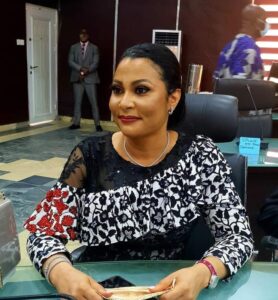
The commissioner for finance and coordinating economy of Imo State, Dr Doris-Anite has promised that with the reforms put in place in the state, the Internal Revenue Service of the state would in the next six months reach its internally generated revenue target.
Dr Anite made this known during the Second Tax Annual Dialogue held in Abuja by the Federal Inland Revenue Service (FIRS) in conjunction with the Joint Tax Board (JTB).
The finance commissioner who was one of the panellists who x-rayed the topic ‘Tax Harmonisation for Enhanced Revenue Generation’ spoke on the need for taxes to be harmonised in order to achieve optimum utilisation.
She spoke on what she called the incentive system where she advocated for proper revenue attribution in order to encourage more collaboration from MDAS. The commissioner said with the deployment of right technology in every sector in the state, the rewards in terms of IGR would soon be visible for all to see.
“We are very optimistic that in the next six months we should be hitting our revenue target because we are deploying a whole lot of technology in every sector to achieve this. We just recently started collecting education levy under examination development fees through our electronic platforms. It used to be manually collected. We will put our universities on a payment portal. However, it is still a work in progress,” she said.
Speaking further on what she met on ground in the state and what is being done, she said “When I came in as finance commissioner and coordinator of the economy, my job was to take care of internally generated revenue. So I had to engage with the MDAs. As coordinating commissioner, I could speak to anybody. We started by looking at their performance and what their revenue target should be based on certain matrix that we put in place. This was to determine the right taxes and who should collect what.
“To make it easy, we decided to have a central technological platform that would access and generate demand notices. The IIRS sees what is being collected and enforces compliance. In engaging with the MDAs, we found out that there is willingness to support the revenue system. But there was one question they kept asking, how do you incentivise us?
“Because in their minds, the cost of collections only goes to IIRS. The bonuses are paid only to IIRS for collection. So to the MDAs, they say I offer the services, but how come I’m not getting any incentive. This is the area the government is looking at to come up with proper legislation to tackle it. The incentive system is a major area we need to look at and come up with the right policies to encourage collection.”
A tax consultant and one of the panellists, Taiwo Oladele advocated for what he described as radical changes in order to solve the myriads of tax issues that arise every in Nigeria. According to him, the constitution should be amended in a way that there should be a central collecting system, limit the number of tax authorities, stop the usage of consultants, and merge the FIRS and Customs service.
President Muhammadu Buhari who was the special guest of honour at the dialogue while declaring open the event decried what he called fragmented administration, multiple and sometimes, overlapping taxes in the country. He said one key deliverable from this year’s dialogue would be to promote synergy in tax administration among the different tiers of government.

